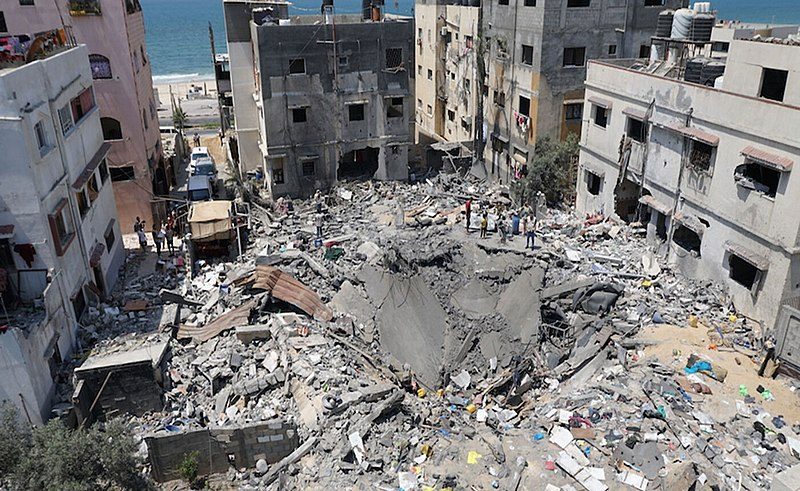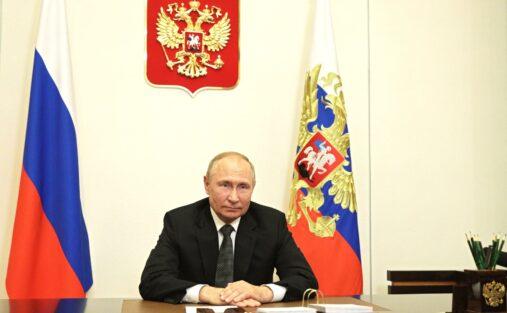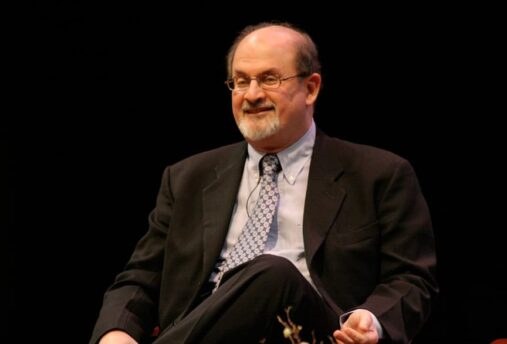Welcome to our roundup of news and current events related to ethics and international affairs! Here’s some of what we’ve been reading this past month:
 Destruction following the Israeli airstrike in August 2022. Photo credit: OCHA (UN) via Wikimedia Commons
Destruction following the Israeli airstrike in August 2022. Photo credit: OCHA (UN) via Wikimedia Commons
The New York Times: Israel and Palestinian Militants Reach a Cease-Fire
Israeli airstrikes in Gaza, which began on August 5, killed 44 Palestinians, including 15 children, said the Palestinian health ministry. This included two key leaders of the Islamic Jihad, the second-largest militant group in Gaza, whose strikes in retaliation over the weekend led to minor injuries of several Israelis. Gaza has been under an economy-crippling land and sea blockade imposed by Israel and Egypt since 2007 when Hamas came to power on the strip, in addition to decades-long Israeli occupation. Hamas did not join in this latest three-day fighting, which ended following an August 7 truce mediated by Egypt, highlighting the tensions between the two militant groups. Several residential buildings as well as Islamic Jihad’s bases and weapons factories in Gaza were destroyed. Egyptian officials continue to mediate negotiations between Israel and Islamic Jihad over releasing two of its leaders, Bassem Saadi and Khalil Awawdeh, from Israeli jails.
Read more about war crimes, just war doctrine, and Israel/Palestine in Ethics & International Affairs:
War Crimes and the Asymmetry Myth (2021: Volume 35.3)
Backfire: The Dark Side of Nonviolent Resistance (2018: Volume 32.3)
“Transitional Justice” in Israel/Palestine? Symbolism and Materialism in Reparations for Mass Violence (January 2015)
 Russian President Vladimir Putin at the 10th Moscow Conference on International Security on August 16. Photo Credit: Presidential Executive Office of Russia via Wikimedia Commons
Russian President Vladimir Putin at the 10th Moscow Conference on International Security on August 16. Photo Credit: Presidential Executive Office of Russia via Wikimedia Commons
AP: Putin blasts US ‘hegemony,’ predicts end to ‘unipolar’ world
Russian President Vladimir Putin once again accused the United States of attempts to encourage extended hostilities in Ukraine in order to maintain its global hegemony, at a security conference attended by international military officials in the country on August 16. Putin also commented on U.S. House Speaker Nancy Pelosi’s recent visit to Taiwan, claiming that this too was part of a “deliberate and conscious” American strategy to provoke global instability, and stated that the unipolar world order was nearing an end. Russian Defense Minister Sergei Shoigu, who spoke at the same conference, dismissed allegations that the country could potentially deploy nuclear or chemical weapons in Ukraine by stating that Russian nuclear forces mainly provide a deterrent against nuclear attacks.
Read more about the liberal world order, armed conflict, and warfare in the twenty-first century in Ethics & International Affairs:
Surrogate Warfare: The Transformation of War in the Twenty-First Century (2020: Volume 34.3)
Wars of Law: Unintended Consequences in the Regulation of Armed Conflict (2019: Volume 33.1)
Russia and the Liberal World Order (2018: Volume 32.1)
 Aerial photograph of Kabul, Afghanistan and the snow-covered Tora Bora mountains in the distance, taken in January 2014. Photo Credit: Michael Foley via Flickr
Aerial photograph of Kabul, Afghanistan and the snow-covered Tora Bora mountains in the distance, taken in January 2014. Photo Credit: Michael Foley via Flickr
Reuters: Taliban mark year in power that has given Afghanistan security but little hope
August 15 marks one year since the Taliban and their supporters regained control over Kabul and took power following a stunning number of battlefield victories against U.S.-led foreign forces and their Afghan allies, and one year since the U.S. withdrawal from Afghanistan after nearly two decades. A Taliban spokesperson said in a statement that the day was “the day of salvation and freedom of the Afghan nation” and acting foreign minister Amir Khan Muttaqi called for positive relationships with other countries. While physical security has improved, Afghanistan is struggling with poverty, drought, and malnutrition following development aid cuts and international isolation, and women, whose access to work and education has been curtailed, remain worried over their role in the country’s future. An estimated 25 million Afghans, over half the population, are currently living in poverty while $9 billion in central bank reserves overseas continue to be frozen by the U.S. and other countries.
Read more about poverty, governance, and conflict resolution in Ethics & International Affairs:
Global Poverty, Injustice, and Resistance (2020: Volume 34.3)
Continuums of Violence and Peace: A Feminist Perspective (2020: Volume 34.1)
A Human Rights Approach to Conflict Resolution (2019: Volume 33.3)
 Author Salman Rushdie at a December 2008 Asia Society panel discussion. Photo Credit: Asia Society via Flickr
Author Salman Rushdie at a December 2008 Asia Society panel discussion. Photo Credit: Asia Society via Flickr
BBC: Salman Rushdie off ventilator and able to talk
The lauded 75-year-old Booker Prize-winning writer is now off the ventilator and able to speak, after being stabbed repeatedly on stage at the Chautauqua Institution in New York state on August 11. About to deliver a lecture, Salman Rushdie was stabbed by 24-year-old Hadi Matar from Fairview, New Jersey, who on August 13 pleaded not guilty to attempted murder. Author of the 1988 novel The Satanic Verses, Indian-born Rushdie has faced death threats—most prominently, a 1989 fatwa by Iran’s then Grand Ayatollah Ruhollah Khomeini along with a $3 million bounty on his head—over the book, considered blasphemous by some Muslims, and was in hiding in the UK for nine years. At Chautauqua, he was about to discuss how the U.S. has served as a haven for writers exiled under threat of persecution. Rushdie suffered damage to his liver and severed nerves in an arm and in an eye that he is likely to lose.
Read more about freedom of expression and human rights in Ethics & International Affairs:
Human Rights in the Seventy-Fifth Year of the UN (2020: Volume 34.3)
Rescuing Human Rights: A Radically Moderate Approach (2020: Volume 34.1)
Reconstructing Human Rights: A Pragmatist and Pluralist Inquiry into Global Ethics by Joe Hoover (2017: Volume 31.4)